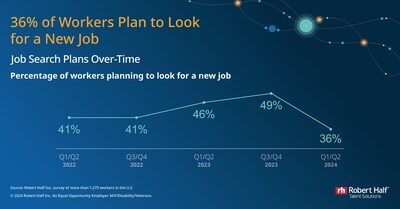Survey: Fewer Workers Plan to Change Jobs Despite Continued Demand for Talent
- Workers are carefully weighing options and generally feel fulfilled in their current roles
- Gen Z and marketing and creative professionals are most likely to make a move
Professionals Most Likely to Make a Move (By Generation and Specialization)
Generation | February 2024 | July 2023 |
Gen Z | 55 % | 74 % |
Millennials | 48 % | 63 % |
Gen X | 28 % | 44 % |
Baby Boomer | 13 % | 23 % |
Specialization | February 2024 | July 2023 |
Marketing and Creative | 55 % | 51 % |
Technology | 45 % | 64 % |
Legal | 40 % | 32 % |
Human Resources | 31 % | 56 % |
Accounting and Finance | 27 % | 41 % |
Administrative and Customer Support | 27 % | 47 % |
What's Contributing to the Big Stay?
Compared to the shifts experienced during the Great Resignation, the research suggests workers are more likely to stay in their current role, at least for the first half of 2024. Some of the reasons they report include:
- Their current job offers a level of flexibility that they aren't willing to lose (
44% ) - They feel fulfilled in their current role (
42% ) - They feel well compensated for their work (
37% )
"The churn in the labor market of the past few years has normalized," said Dawn Fay, operational president of Robert Half. "We're now seeing workers pause and take stock of their careers, as well as employers taking a more strategic approach to hiring."
Demand is High for Skilled Workers
For professionals looking to make a change in 2024, there are opportunities. According to Robert Half's State of Hiring report,
Read more about The Demand for Skilled Talent.
Workers' Main Motivators
Workers have made it clear that they aren't likely to make a move unless the opportunity meets certain criteria. When asked what would lead them to look for a new position, workers cited:
- A higher salary (
55% ) - Better benefits and perks (
36% ) - A job with more remote flexibility than my current company offers (
32% )
Fay added: "While employers may have more leverage in today's job market, they still face hiring challenges. Professionals who possess the desired skills to help boost company productivity, alleviate workloads and complete mission critical projects are still in high demand. Hiring managers should have a thoughtful plan in place so they are ready to compete for talent."
About the Research
The online survey was developed by Robert Half and conducted by an independent research firm from Oct. 27 – Nov.17, 2023. It includes responses from more than 1,275 workers 18 and older in finance and accounting, technology, marketing and creative, legal, administrative and customer support, human resources, and other areas at companies with 20 or more employees in
About Robert Half
Robert Half (NYSE: RHI) is the world's first and largest specialized talent solutions firm that connects opportunities at great companies with highly skilled job seekers. Offering contract talent and permanent placement solutions in the fields of finance and accounting, technology, marketing and creative, legal, and administrative and customer support, Robert Half has more than 400 locations worldwide, including nearly 100 locations in 18 countries outside the United States. Robert Half is the parent company of Protiviti®, a global consulting firm that provides internal audit, risk, business and technology consulting solutions. Robert Half, including Protiviti, has been named one of the Fortune® Most Admired Companies™ and 100 Best Companies to Work For and is a Forbes Best Employer for Diversity. Explore our comprehensive solutions, research and insights at RobertHalf.com.
![]() View original content to download multimedia:https://www.prnewswire.com/news-releases/survey-fewer-workers-plan-to-change-jobs-despite-continued-demand-for-talent-302053946.html
View original content to download multimedia:https://www.prnewswire.com/news-releases/survey-fewer-workers-plan-to-change-jobs-despite-continued-demand-for-talent-302053946.html
SOURCE Robert Half









